一般将来时专项练习(含答案)
- 格式:docx
- 大小:37.85 KB
- 文档页数:6
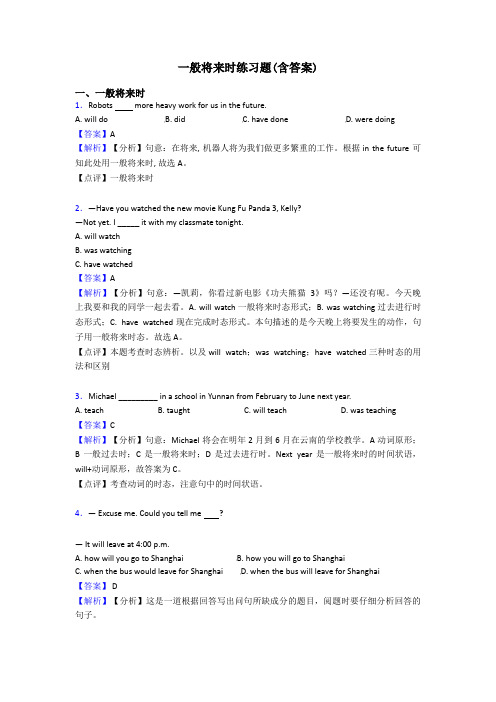
一般将来时练习题(含答案)一、一般将来时1.Robots more heavy work for us in the future.A. will doB. didC. have doneD. were doing【答案】A【解析】【分析】句意:在将来, 机器人将为我们做更多繁重的工作。
根据in the future 可知此处用一般将来时, 故选A。
【点评】一般将来时2.—Have you watched the new movie Kung Fu Panda 3, Kelly?—Not yet. I _____ it with my classmate tonight.A. will watchB. was watchingC. have watched【答案】A【解析】【分析】句意:—凯莉,你看过新电影《功夫熊猫3》吗?—还没有呢。
今天晚上我要和我的同学一起去看。
A. will watch一般将来时态形式;B. was watching过去进行时态形式;C. have watched现在完成时态形式。
本句描述的是今天晚上将要发生的动作,句子用一般将来时态。
故选A。
【点评】本题考查时态辨析。
以及will watch;was watching;have watched三种时态的用法和区别3.Michael _________ in a school in Yunnan from February to June next year.A. teachB. taughtC. will teachD. was teaching【答案】C【解析】【分析】句意:Michael将会在明年2月到6月在云南的学校教学。
A动词原形;B一般过去时;C是一般将来时;D是过去进行时。
Next year是一般将来时的时间状语,will+动词原形,故答案为C。
【点评】考查动词的时态,注意句中的时间状语。
4.— Excuse me. Could you tell me ?— It will leave at 4:00 p.m.A. how will you go to ShanghaiB. how you will go to ShanghaiC. when the bus would leave for ShanghaiD. when the bus will leave for Shanghai【答案】 D【解析】【分析】这是一道根据回答写出问句所缺成分的题目,阅题时要仔细分析回答的句子。
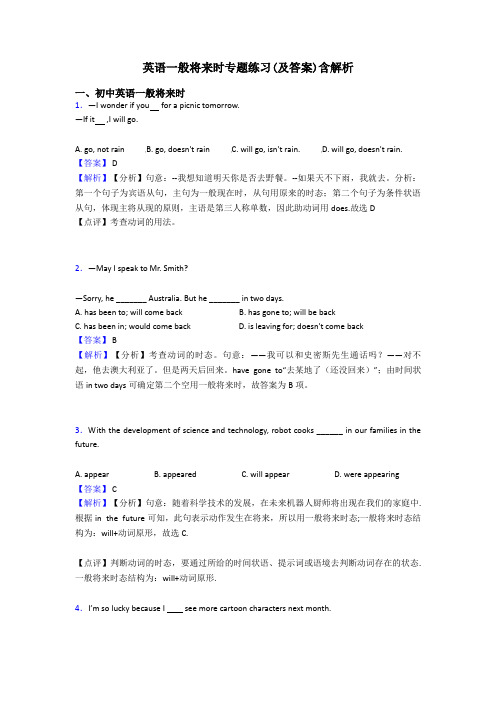
英语一般将来时专题练习(及答案)含解析一、初中英语一般将来时1.—I wonder if you for a picnic tomorrow.—If it ,I will go.A. go, not rainB. go, doesn't rainC. will go, isn't rain.D. will go, doesn't rain.【答案】 D【解析】【分析】句意:--我想知道明天你是否去野餐。
--如果天不下雨,我就去。
分析:第一个句子为宾语从句,主句为一般现在时,从句用原来的时态;第二个句子为条件状语从句,体现主将从现的原则,主语是第三人称单数,因此助动词用does.故选D【点评】考查动词的用法。
2.—May I speak to Mr. Smith?—Sorry, he _______ Australia. But he _______ in two days.A. has been to; will come backB. has gone to; will be backC. has been in; would come backD. is leaving for; doesn't come back【答案】 B【解析】【分析】考查动词的时态。
句意:——我可以和史密斯先生通话吗?——对不起,他去澳大利亚了。
但是两天后回来。
have gone to“去某地了(还没回来)”;由时间状语in two days可确定第二个空用一般将来时,故答案为B项。
3.With the development of science and technology, robot cooks ______ in our families in the future.A. appearB. appearedC. will appearD. were appearing【答案】 C【解析】【分析】句意:随着科学技术的发展,在未来机器人厨师将出现在我们的家庭中. 根据in the future可知,此句表示动作发生在将来,所以用一般将来时态;一般将来时态结构为:will+动词原形,故选C.【点评】判断动词的时态,要通过所给的时间状语、提示词或语境去判断动词存在的状态. 一般将来时态结构为:will+动词原形.4.I’m so lucky because I see more cartoon characters next month.A. is able toB. will be able toC. be able toD. was able to【答案】B【解析】【分析】句意:我真幸运因为我下个月能看到更多的卡通人物。

初中英语:一般将来时专项练习题1.Each time tourists travel to Beijing, they_______ the Forbidden City. A.will be shown up B.will be shown aroundC.will show around D.will show to【答案】B【解析】【详解】考查一般将来时被动语态的用法。
短语show up意为“揭露”,show around意为“带领……看”,此处明显是指那些人被领着参观紫禁城,每次都要被带着去参观,主语和show around之间是被动关系,所以用被动语态;故选B。
2.A new zoo in that area next year.A.built B.was builtC.builds D.will be built【答案】D【解析】【详解】试题分析:句意:一个新的动物园明年将要建成了。
根据时间状语next year.用一般将来时,有根据题意可知用被动语态be done的结构可知用将来时的被动语态。
结合句意,故选D考点:考查动词的时态和语态。
3.The 10th China flower expo ______ in Chongming Island from March to July in 2021.A.was held B.will be held C.is held D.has been held 【答案】B【解析】【分析】【详解】句意:第十届中国花卉博览会将于2021年3月至7月在崇明岛举行。
考查被动语态。
was held被举行,一般过去时的被动结构;will be held将被举行,一般将来时的被动结构;is held被举行,一般现在时的被动结构;has been held被举行,现在完成时的被动结构;根据句意理解及句中的时间in 2021可知,这里表达的是将来的事情,所以动词应该用将来时,而主语The 10th China flower expo与动词hold之间是被动关系,所以应该用被动语态,故选B。

一般将来时专项练习题及答案详解一、单项选择一般将来时1. -- How many people are expected to come to your party tomorrow afternoon?-- I send out thirty invitations but one third _____.A.didn’t show up B.won’t show upC.hadn’t showed up D.doesn’t show up【答案】B【解析】试题分析:考查时态。
根据语境及时间状语tomorrow afternoon可知用一般将来时。
句意:——期望有多少人来参加你明天的宴会?——我送出了30份邀请,但三分之一将不会出现。
故B正确。
考点:考查时态2.“When he _____ is not known yet.” “But when he ____, he will be warmly welcomed.”A.comes, comes B.will come, will comeC.comes, will come D.will come, comes【答案】D【解析】试题分析:考查时态:第一个when引导的主语从句,用将来时,第二个when引导的时间状语从句,用一般现在时代替一般将来时,句意:他什么时候来还不知道。
但当他回来时,他会收到热烈的欢迎。
选D。
考点:考查时态语态点评:时间条件状语从句的时态不能用一般将来时,而用一般现在时代替,考查时态还要注意语态。
3.However hard he tries,the recorder .A.didn’t work B.won’t work C.isn’t working D.hasn’t work ed【答案】B【解析】试题分析:考查will用法。
句意:无论他多么努力尝试,这个录音机就不工作了。
本题中的will表示的是一种倾向性,如The door won’t open.故B正确。

一般将来时专项练习及答案详解一、单项选择一般将来时1.---Let’s throw a surprise party for mom’s 50th birthday.---That’s a good idea.We______several of her friends.A.invite B.have invited C.are inviting D.will invite【答案】D【解析】本题考查时态。
根据句意“我们将邀请她的一些朋友”可知用一般将来时。
句意:——让我们在妈妈50岁给她一个惊喜。
——好想法,我们将邀请她的一些朋友。
2.Half the world’s population ______ water shortages within 15 years according to the World Bank, just one of many recent alarming reports on the world’s fresh water supply.A.are suffering B.have been suffered C.will suffer D.were suffered 【答案】C【解析】试题分析:根据时间状语within 15 years,故用一般将来时。
考点:时态考查题点评:通过时间状语,上下句意思和具体语境来确定时态。
3.--I have you asked John to come to the party this evening?--Yes,I have,but he____A.doesn't B.hasn't C.hadn't D.won't【答案】D【解析】试题分析:此处doesn't 表示一般现在时; hasn't 现在完成时;hadn't 过去完成时; won't 一般将来时,意为:不愿,表意愿。
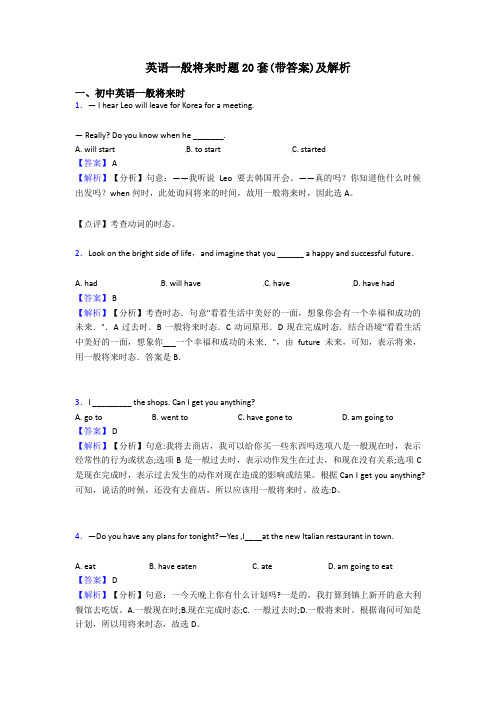
英语一般将来时题20套(带答案)及解析一、初中英语一般将来时1.— I hear Leo will leave for Korea for a meeting.— Really? Do you know when he _______.A. will startB. to startC. started【答案】 A【解析】【分析】句意:——我听说Leo要去韩国开会。
——真的吗?你知道他什么时候出发吗?when何时,此处询问将来的时间,故用一般将来时,因此选A。
【点评】考查动词的时态。
2.Look on the bright side of life,and imagine that you ______ a happy and successful future.A. hadB. will haveC. haveD. have had【答案】 B【解析】【分析】考查时态.句意"看看生活中美好的一面,想象你会有一个幸福和成功的未来.".A过去时.B一般将来时态.C动词原形.D现在完成时态.结合语境"看看生活中美好的一面,想象你___一个幸福和成功的未来.",由future未来,可知,表示将来,用一般将来时态.答案是B.3.I _________ the shops. Can I get you anything?A. go toB. went toC. have gone toD. am going to【答案】 D【解析】【分析】句意:我将去商店,我可以给你买一些东西吗迭项八是一般现在时,表示经常性的行为或状态;选项B是一般过去时,表示动作发生在过去,和现在没有关系;选项C 是现在完成时,表示过去发生的动作对现在造成的影响或结果。
根据Can I get you anything?可知,说话的时候,还没有去商店,所以应该用一般将来时。
故选:D。
4.—Do you have any plans for tonight?—Yes ,I____at the new Italian restaurant in town.A. eatB. have eatenC. ateD. am going to eat【答案】 D【解析】【分析】句意:一今天晚上你有什么计划吗?一是的,我打算到镇上新开的意大利餐馆去吃饭。

初中英语:一般将来时专项练习题1.Teenagers _________ to look after themselves from a young age. A.should educate B.should be educated C.shouldn’t be educated D.not should educate【答案】B【解析】【详解】句意:青少年应该接受教育,从小就照顾自己。
考查被动语态。
should应该,后接原形动词;本句主语teenagers青少年,是动词educate 的受动者,需用被动语态,可排除AD选项。
根据句意语境,可知本句是肯定意义,故选B。
2.The 31th Olympic Games _______ in Rio de Janeiro of Brazil in 2016. A.is held B.will holdC.will be held D.is going to hold【答案】C【解析】【详解】试题分析:句意:第31届奥运会将于2016年在巴西里约热内卢举行。
举办奥运会,The 31th Olympic Games在句中作主语,用被动语态。
2016年将要发生的动作,用一般将来时态。
故选C。
【考点定位】:考查动词时态及语态辨析。
3.— How can we help the poor children ?— An organization for providing basic education will be _________. A.setted up B.set up C.setting up D.to set up 【答案】B【解析】【详解】句意:-----我们如何帮助贫困儿童?----提供基础教育的组织将被建立。
考查一般将来时的被动语态。
根据句意可知此句是一般将来时的被动语态,其构成will be done;set up:建立,创建,设立;过去分词是set up;故选B。

一般将来时练习题(含答案)经典一、一般将来时1.— I hear Leo will leave for Korea for a meeting.— Really? Do you know when he _______.A. will startB. to startC. started【答案】 A【解析】【分析】句意:——我听说Leo要去韩国开会。
——真的吗?你知道他什么时候出发吗?when何时,此处询问将来的时间,故用一般将来时,因此选A。
【点评】考查动词的时态。
2.I don't know whether mom _________ me to Beijing next week.A. takeB. takesC. will takeD. would take【答案】 C【解析】【分析】句意:我不知道妈妈下周是否会带我去北京。
分析句子结构可知,此处是宾语从句,主句时态为一般现在时,从句时态根据主现从任原则,再根据从句中的next week可知,从句应该是表示将来的动作,所以用一般将来时,用will do形式,故选C。
【点评】考查宾语从句时态。
注意宾语从句时态的主现从任原则。
3.I’m so lucky because I see more cartoon characters next month.A. is able toB. will be able toC. be able toD. was able to【答案】B【解析】【分析】句意:我真幸运因为我下个月能看到更多的卡通人物。
next month表将来,因此用will be able to。
故选B。
【点评】考查一般将来时。
4.Look on the bright side of life,and imagine that you ______ a happy and successful future.A. hadB. will haveC. haveD. have had【答案】 B【解析】【分析】考查时态.句意"看看生活中美好的一面,想象你会有一个幸福和成功的未来.".A过去时.B一般将来时态.C动词原形.D现在完成时态.结合语境"看看生活中美好的一面,想象你___一个幸福和成功的未来.",由future未来,可知,表示将来,用一般将来时态.答案是B.5.We ________ a party for Kate. It's supposed to be a surprise.A. were havingB. hadC. will haveD. have had【答案】C【解析】【分析】句意:我们将为凯特举办一个聚会。

(英语)英语一般将来时题20套(带答案)含解析一、单项选择一般将来时1.The project to developing the economy and reducing poverty when it is completed. A.has contributed B.had been contributedC.will contribute D.is contribute【答案】C【解析】试题分析:考查动词的时态。
句意:这项工程在竣工后,将会继续发展经济,减少贫穷。
根据句意可知表示将要发生的事情,用一般将来时,选C考点 : 考查动词的时2.As you go through this book, you ________ that each of the millions of people who lived through World War II had a different experience.A.will find B.foundC.had found D.have found【答案】A【解析】试题分析:一般将来时表示将要发生的动作或情况。
在一般将来时的句子中,有时有表示将来时间的状语,有时没有时间状语,这时要从意思上判断是否指未来的动作或情况。
句意:当你通读这本书的时候,你将会发现成千上万的经历过二战的每个人都有不同的经历。
根据句意,判断主语的时态为一般将来时,故选A【考点定位】考查时态。
3.---Do you have any special plan for this weekend?---Yes. I _____ my daughter to Disneyland.A.am going to take B.take C.have taken D.would take【答案】A【解析】试题分析:考查时态。
根据句中的时间状语this weekend,可以判断用将来时。
英语中经常用现在进行时代替将来时。



【英语】一般将来时专项练习及答案详解一、单项选择一般将来时1.With a travelling speed of up to 350 kilometres per hour, the railway to be built between Beijing and Shanghai _______ the journey time from 12 hours to 5 hours.A.cuts B.will cut C.is cutting D.has cut【答案】B【解析】考查时态。
句意“将要被建的北京至上海的铁路,时速达350Km/时,将把两地的旅途用时从12小时缩短到5小时。
”根据to be built可知,铁路是将要建设,故用将来时。
故选B。
2.We are confident that the environment ______ by our further efforts to reduce pollution. A.had been improved B.will be improvedC.is improved D.was improved【答案】B【解析】试题分析:考查时态。
根据“我们相信”说明时间将来发生,所以用将来被动。
【名师点睛】这题考查的是不同时态的被动语态。
关键是确定时态。
要抓住句子的上下文含义和句中的时间状语。
这句话没有明确的时间状语。
这时要根据上下文的语境选择合适的时态,对句意的理解就很关键了。
3.As your spoken English gets better, so ___ your written English.A.will B.do C.is D.has【答案】A【解析】试题分析:考查倒装句和时态:第一空是倒装句的肯定形式:So + 助动词/情态动词/be动词+ 主语,表示“主语和前面句子的主语一样,做同样的事”,解释为“主语也……。
”第二个点考查主将从现,所以助动词要使用will/shall。

英语一般将来时专题(含答案)含答案解析百度文库一、初中英语一般将来时1.There ______ a funny cartoon on CCTV 6 this evening.A. willB. will haveC. is going to beD. is going to have【答案】 C【解析】【分析】句意:今天晚上CCTV6有一部有趣的动画片。
今天晚上,将会有,用there will be 或者there is going to be因为a funny cartoon是单数。
故选C。
【点评】考查时态的用法。
2.— Let's go fishing if it this weekend.— But nobody knows if it .A. is fine; will rainB. will be rain; rainsC. will be fine; will rainD. is fine; rains 【答案】 A【解析】【分析】句意:——如果这个周末晴天我们去钓鱼吧。
——但是没人知道是否会下雨。
第一个空前的if引导条件状语从句,意思是“如果”,从句中用一般现在时表示将来;第二个空前的if引导宾语从句,意思是“是否”,根据从句的tomorrow可知用一般将来时;故选A。
【点评】考查动词的时态。
3.If you go to bed earlier, you tired in the morning.A. will feelB. don't feelC. won't feelD. didn't feel【答案】 C【解析】【分析】句意:如果你上床睡觉早些,在早上你就不会感觉到累了。
此题考查if 引导的条件状语从句,主句一般将来时,从句用一般现在时。
根据句意,故选C。
【点评】考查动词时态。
掌握主将从现的句子结构。
4.—Have you finished the poster for the party?—Not yet. I it in two days.A. finishB. finishedC. will finishD. have finished【答案】 C【解析】【分析】此题的关键点在“in two days”和一般将来时连用,故选C。
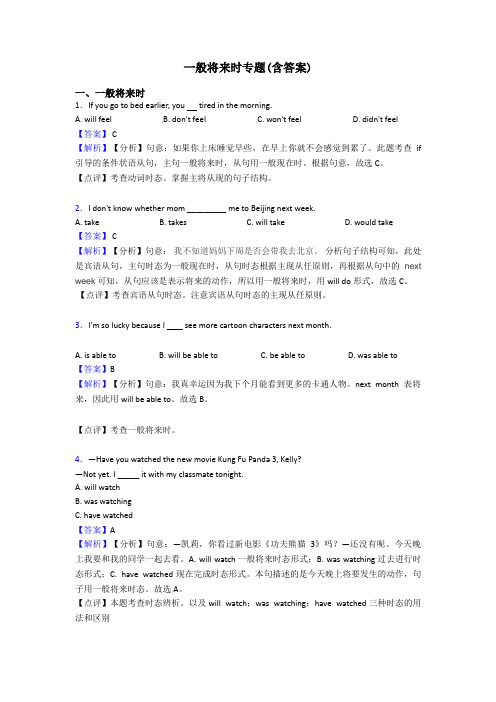
一般将来时专题(含答案)一、一般将来时1.If you go to bed earlier, you tired in the morning.A. will feelB. don't feelC. won't feelD. didn't feel【答案】 C【解析】【分析】句意:如果你上床睡觉早些,在早上你就不会感觉到累了。
此题考查if 引导的条件状语从句,主句一般将来时,从句用一般现在时。
根据句意,故选C。
【点评】考查动词时态。
掌握主将从现的句子结构。
2.I don't know whether mom _________ me to Beijing next week.A. takeB. takesC. will takeD. would take【答案】 C【解析】【分析】句意:我不知道妈妈下周是否会带我去北京。
分析句子结构可知,此处是宾语从句,主句时态为一般现在时,从句时态根据主现从任原则,再根据从句中的next week可知,从句应该是表示将来的动作,所以用一般将来时,用will do形式,故选C。
【点评】考查宾语从句时态。
注意宾语从句时态的主现从任原则。
3.I’m so lucky because I see more cartoon characters next month.A. is able toB. will be able toC. be able toD. was able to【答案】B【解析】【分析】句意:我真幸运因为我下个月能看到更多的卡通人物。
next month表将来,因此用will be able to。
故选B。
【点评】考查一般将来时。
4.—Have you watched the new movie Kung Fu Panda 3, Kelly?—Not yet. I _____ it with my classmate tonight.A. will watchB. was watchingC. have watched【答案】A【解析】【分析】句意:—凯莉,你看过新电影《功夫熊猫3》吗?—还没有呢。
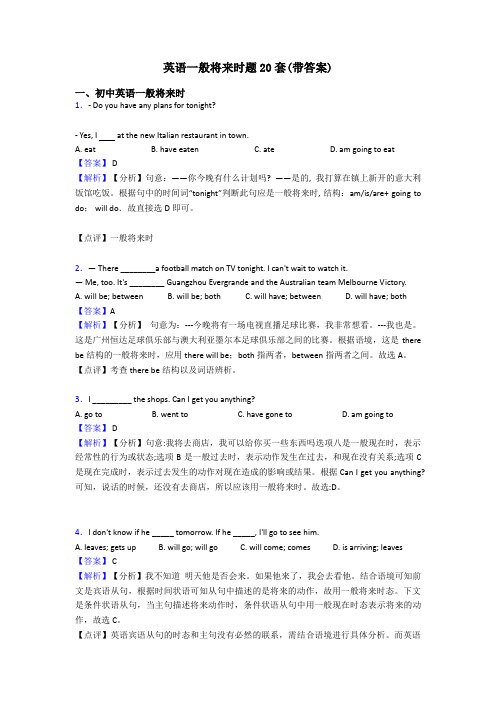
英语一般将来时题20套(带答案)一、初中英语一般将来时1.- Do you have any plans for tonight?- Yes, I at the new Italian restaurant in town.A. eatB. have eatenC. ateD. am going to eat【答案】 D【解析】【分析】句意:——你今晚有什么计划吗? ——是的, 我打算在镇上新开的意大利饭馆吃饭。
根据句中的时间词“tonight”判断此句应是一般将来时, 结构:am/is/are+ going to do; will do.故直接选D即可。
【点评】一般将来时2.— There ________a football match on TV tonight. I can't wait to watch it.— Me, too. It's ________ Guangzhou Evergrande and the Australian team Melbourne Victory.A. will be; betweenB. will be; bothC. will have; betweenD. will have; both【答案】A【解析】【分析】句意为:---今晚将有一场电视直播足球比赛,我非常想看。
---我也是。
这是广州恒达足球俱乐部与澳大利亚墨尔本足球俱乐部之间的比赛。
根据语境,这是there be结构的一般将来时,应用there will be;both指两者,between指两者之间。
故选A。
【点评】考查there be结构以及词语辨析。
3.I _________ the shops. Can I get you anything?A. go toB. went toC. have gone toD. am going to【答案】 D【解析】【分析】句意:我将去商店,我可以给你买一些东西吗迭项八是一般现在时,表示经常性的行为或状态;选项B是一般过去时,表示动作发生在过去,和现在没有关系;选项C 是现在完成时,表示过去发生的动作对现在造成的影响或结果。

一般将来时专项练习题及答案详解一、单项选择一般将来时1.If Kate goes to the gym this weekend, _______.A.so do I B.so I doC.so will I D.so I will【答案】C【解析】试题分析:句意:如果凯特这个周末去体育馆,我也去。
If引导的条件状语从句用一般现在时态表示一般将来时态,主句用一般将来时态;又因为前句说Kate去体育馆,后句说I也去体育馆,故用全部倒装。
故选C。
考点:考查时态和全部倒装句。
2.---It ______ be only two days before I have the job interview.---______ you succeed.A.must; May B.must; Should C.will; May D.will; Should【答案】C【解析】试题分析:考查倒装句和时态。
第一空考查了固定句式中的时态。
固定句式:it be 一段时间 before从句;当Before引导的时间状语从句中使用一般现在时的时候,前面的主句使用将来时。
第二空使用倒装句的形式may you succeed祝你成功。
考点:考查倒装句和时态点评:固定句式:it be 一段时间 before从句;当Before引导的时间状语从句中使用一般现在时的时候,前面的主句使用将来时。
May放在句首,运用倒装句表示对对方的祝愿。
3.A good film producer must make sure that his films ____ fit into the needs of the changing market.A.are to B.will C.are going to D.are about to【答案】A【解析】试题分析:考查将来时的表达法。
Be to do sth表示计划的事情;表示注定要做某事;也可以表示命令做某事,相当于have to, must,should; will表示一般的将来,或者临时决定做某事;be going to do sth表示按照计划安排要做某事;或者根据某种迹象要做某事;be about to do sth即将做某事,不与表示将来时的时间状语连用。

英语一般将来时题20套(带答案)一、单项选择一般将来时1.(东北三校一模)I am certain by no means ________ his word since he has promised an amount of money to the poor.A.he will break B.will he breakC.broke D.did he break【答案】B【解析】B句意:我确信既然他答应捐一笔钱给穷人,他绝不会食言的。
by no means(绝不)为表示否定意义的介词短语,置于句首时,其后面的主谓语要倒装,根据句意可知设空处需用一般将来时,故答案为B项。
2.The students have been working hard on their lessons and their efforts _____ with success in the end.A.rewarded B.were rewardedC.will reward D.will be rewarded【答案】D【解析】【分析】【详解】本题考查时态和语态。
解题步骤:1. 确定时态:根据句尾的in the end可知,事情发生在将来,用将来时。
2. 确定语态:efforts和reward是被动关系,应该使用被动语态。
句意:学生们一直在刻苦学习功课,他们的努力终将会得到回报。
综上,用一般将来时的被动,故选D。
【点睛】一般将来时1. 表示未来的动作或状态常用will / shall + 动词(常与表示将来的时间状语边用如tomorrow、next week等)。
2. 表示一种趋向或习惯动作。
例如:We’ll die without air or water.3. 表示趋向行为的动词如come, go, start, begin, leave等词常用进行时的形式表示将来时。
4. be going to与will / shall, be to do, be about to do用法及区别:(1)shall / will do表示未事先考虑过,即说话时临时作出的决定。

一般将来时专项练习(含答案)
1.There will XXX.
2.Charlie won't work here next month.
3.He is very busy this week。
but he will be free next week.
4.There is going to be a dolphin show in the XXX.
5.Are you going to be free tomorrow。
No。
I will be free the day after tomorrow.
6.Mother will give me a nice present on my next birthday.
7.No。
please don't.
8.I will get it for you at once.
9.Will there be a concert next Saturday?
10.If they come。
we will have a meeting.
11.He will give her a beautiful hat on her next birthday.
12.He will write to us as soon as he gets there.
13.He will come back in three days.
14.If it doesn't rain tomorrow。
we'll go roller-skating.
15.They won't go.
16.Who will we go XXX?
17.We will do the work this way next time.
18.Tomorrow。
he plans to fly a kite in the open air first and then go boating in the park。
(n A)
19.The day after tomorrow。
they will watch a volleyball match。
(n D)
20.There will be a birthday party this Sunday。
(n B)
21.They are going to have an English evening next Sunday。
(n B)
22.Will you be free next Sunday。
(n B)
23.He will be there at ten XXX(n C)
24.Is your brother going to borrow a magazine from the library。
(n B)
25.Yes。
please。
(n A)
26.It will be the year of the horse next year.
27.Will you please open the window?
28.I am coming.
29.It will take us a long time to learn English well.
30.The train is arriving at 11.
1.I am leaving in a minute。
I have finished all my work before I leave.
2.- How long have you been studying in our country?
I plan to be here for about one more year.
I hope to visit the other parts of your country.
What will you do after you leave here?
I will return home and get a job.
3.I am tired。
I will go to bed early tonight.
6.B
7.A
8.C
9.A10.B
二、改错和改写。
4.XXX’XXX XXX。
and her mother will give her a present.
5.It is very cold these days。
It may XXX.
6.Will you be here this Saturday。
No。
I am visiting my teacher.
7.Can I get you a copy of today’s newspaper。
Thank you.
8.I am afraid there is a meeting this afternoon。
so I can’t join you.
9.XXX't believe this until he saw it with his own eyes.
10.Most of us don't think their team will win.
三、句型转换。
1.People in the north will often go XXX winter.
2.There will be two cinemas in that town next year.
3.He will come back late in two days.
4.XXX.
5.Li Ming will be eleven years old next year.
6.I will sometimes write to XXX.
7.He will go there by plane some day next year.
8.China will be a modern and strong country in XXX.
9.Will you study hard from now on?
10.XXX long.
文章已经被删除,无法进行格式错误的修改和段落的删除。
以下是动词填空和句型转换的答案:
二、动词填空。
1.I am leaving now。
but I will finish the project before the deadline and leave it on your desk.
2.Tomorrow。
I will study for my exam in the morning。
then plan my trip to Europe in the afternoon。
I hope I will have time to do some shopping before I leave。
I will leave around 6 pm and
will return in two weeks。
I will get in touch with you when I come back.
3.I am sorry。
I can't meet you tonight。
but I will call you tomorrow.
4.If you come to the party。
I will give you a special gift.
5.According to the weather forecast。
it will XXX.
6.Will you be at home tomorrow。
If you will be。
I will visit you.
7.Shall we go to the park tomorrow morning。
I will get up early and pick you up.
8.I will be in London next week。
so I XXX.
9.XXX it until he sees it with his own eyes.
10.I am sure our team will win the game tomorrow.
三、句型转换。
6.Tonight。
I am going to write to XXX.
7.Some day next year。
he plans to go there by XXX.
8.XXX years。
China is expected to e a modern and strong country.
9.Are you going to study hard from now on?
10.She is not going to XXX.
11.What is the reason for the plane's crash?
12.What time will they arrive?
13.XXX to start after eight o'clock.
14.Is he going to finish the work in April? No。
he is not.
15.Are they going to arrive on time?。